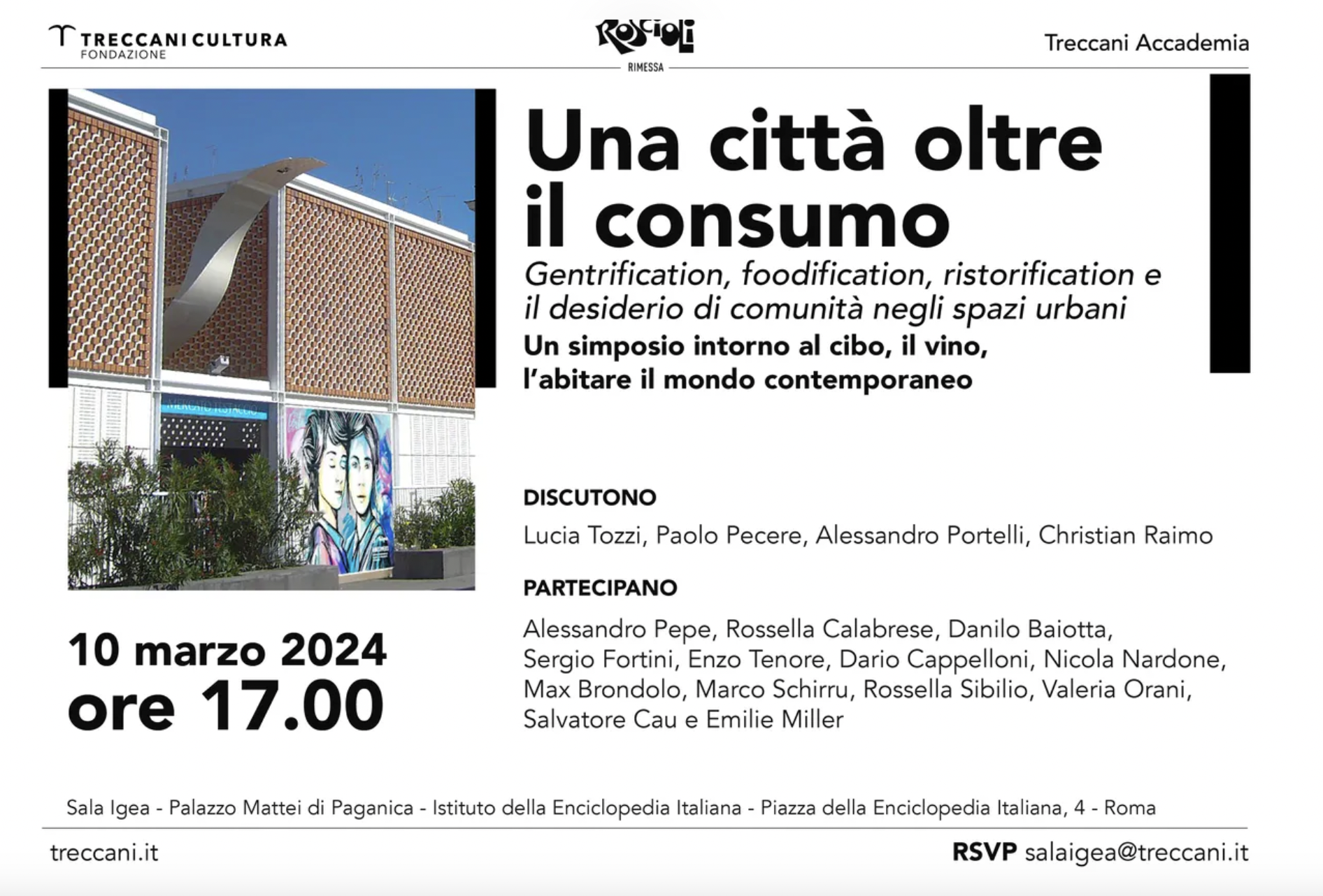UNA CITTÀ OLTRE IL CONSUMO | A CITY BEYOND CONSUMPTION: Fondazione Treccani Cultura + Treccani Accademia in collaboration with Rimessa Roscioli.
UNA CITTÀ OLTRE IL CONSUMO
A CITY BEYOND CONSUMPTION
Midway through Sunday evening’s spirited symposium “Una città oltre il consumo,” wine glasses were handed out to all audience members and symposium participants. And as wine is created for togetherness, we drank wine—together—created by the devotion and labor of people sitting next to us. Suddenly the dialogue about city, countryside, food, wine, place, and desire for community in the contemporary world became even more… spirited. This is when the alchemy took place at the Fondazione Treccani Cultura and Treccani Accademia, facilitated by Rimessa Roscioli. When talking about how things are made, it is deeply important to move beyond the theoretical and to hear from the people who make those very things. The how and the why and the where. And it is deeply important to listen.
At its most noble, I believe art aspires to give the tools for how to listen and how to see things that may normally go unnoticed. Things are less easily dismissed or destroyed when they are no longer abstract.
This is how a tiny town of less than 700 inhabitants, a place which, at first glance, seems like nothing is happening, becomes a rich glittering world of history, people, wine, and story, the bedrock of which is stubborn optimism, tradition, resilience, humor, curiosity about art, radical faith in the future, & an unequivocal understanding that the wine you make is better than all the other 149 home cantine in town. And of course a hospitality that, like love, will powerfully break open your heart immeasurably and see to it that you will never underestimate the power of the little seemingly nondescript town ever again.
This story can be told in a book.
This story can be shared in a glass of wine.
Once you know these stories, you become more than a mere consumer. You become a fellow custodian, these stories become yours to tell and share.
Such an honor to be a small part of Sunday evening’s symposium which ended with a bit of Mariachi music. Let’s continue the conversation…
Thanks to everyone who made this evening possible. And thanks, come sempre, to Neoneli.
Including a couple relevant excerpts from the excellent Orion Magazine piece by Robert Macfarlane about Barry Lopez (who I mentioned in my remarks) “Geography as Generosity: An Afternoon with Barry Lopez.”
“… A belief that having such language available to us is vital because it encourages the kinds of allegiance and intimacy with one’s places that might also go by the name of love, and out of which might arise care, grace, and good sense. I think of Home Ground, really, as less of a dictionary or onomasticon and more of a uniquely structured prose poem, exquisite in its precision and its metaphors and hopeful in its vision. It advances a way of seeing, as Barry put it in the introduction, that might “keep us from slipping off into abstract space…
A keynote—a grace note, really—of Barry’s vast and varied body of work concerns the need to speak with precision about the places you inhabit and that inhabit you. To be able to disaggregate and denote the elements of your home ground is not to practice an Adamic, possessive form of naming, but rather to sharpen perception—and to begin to honor the immense complexities, human and more-than-human, of a given landscape and its communities. Good place-language, well used, opens onto mystery, grows knowledge, and summons wonder. And in the absence of an exact and detail-giving lexis, the living world can blur into a generalized wash of green, becoming an easily disposable backdrop. Certainly, the nuances observed by specialized vocabularies of place-perception are evaporating from common usage, burnt off by capital, apathy, and virtualization. The terrain beyond the city fringe has become progressively more understood in terms of large generic units (field, hill, valley, wood) and as such, more exploitable. Landscape has become blandscape, ripe for rezoning. We are increasingly blasé about place, in the sense that Georg Simmel used the term in his 1903 essay “The Metropolis and Mental Life,” to mean “indifferent to the distinction between things.”
